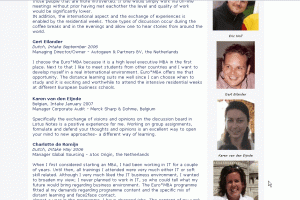
Many business programs suffer from a lack of international recognition, says Dr. Stuart Dixon, Program Director at Euro*MBA (which The Economist ranked as the world’s #3 online business school in 2010). Top national programs therefore fail to appear on expats’ radars.
Dixon talks to Expat Marketing about how business schools can use online learning to target up-and-coming expat professionals.
What makes online learning a better option for expats?
Most expats are on assignments for limited periods of time, so it’s impossible for them to both have a career and complete a degree at a university.
One of our students, who works with LaFarge, told me, “if I don’t move that says something about my career.” This means these people might only have a year or two in a given country.
This makes integrating abroad more difficult …
Most of these expat professionals don’t have time to learn the language. If they do they’re certainly not fluent. For this reason, education at a local university is simply not an option … if there’s any local option at all.
It seems like there are more business programs than ever before… why is access such a problem?
A lot of expatriates are now working in developing countries, sometimes in remote areas. We had a student working on an oil rig out in the middle of the ocean. We have another working in Angola. Because of the security situation there he has to live and work in a compound. So these aren’t just run-of-the-mill scheduling issues.
It sounds like a very specific segment. Can you profile the typical expat professional looking for business education?
Our typical Euro*MBA student is someone with ten years work experience, also experience in management. Often they have technical expertise in an area such as engineering. Sometimes that’s why they’re overseas in the first place. In many cases they are also now project managers, people on track for top management positions.
Before or during the programme the average salary is EUR 40,000-60,000 and upon graduation the average salary increases to EUR 60,000-80,000.
How does the specific nature of the target group impact your marketing?
Our marketing goal is to reach as many international professionals as possible. And we try to do so by concentrating our efforts and resources in online campaigns with a broad international coverage.
We also market in multiple languages. In our Google Adwords campaign we present the Euro*MBA profile in English, Dutch, Spanish, German, French and Polish.
Your program is run by six European schools. Has this helped the individual member schools market themselves?
One thing about these schools is they are all very strong national brands. Take Maastricht, for example. We are the number one university in Holland. But if you go to France I don’t think many people have heard of Maastricht. Euro*MBA has helped develop that recognition across borders. When students graduate they get diplomas signed by all six schools, for example.
Also, since joining the consortium many schools have also formed individual partnerships of their own. You can learn a lot about education and schools through those kinds of partnerships.
How does the program coordinate marketing efforts across all six schools?
Consortium schools are expected to include the Euro*MBA profile as part of the school’s curriculum and in all marketing activities. Euro*MBA partners also represent the Euro*MBA at international fairs worldwide. At the annual meeting of marketing representatives we share best practices and propose new campaigns for the Euro*MBA, following the experience the schools have had with their local programs.

Can you give some examples of specific campaigns Euro*MBA has run?
Currently the biggest campaign we are running is the Google Adwords campaign, which has helped us gain a lot of visibility since 2008–the amount of valid information requests has doubled since then.
Another successful activity are our Open Days and Class Experiences, where we meet prospective students in person. In 2011, of the 12 attendees who visited us during an Open Day or Class Experience, 4 applied for the Euro*MBA within the same year. One will do so for the January 2012 intake.
Does marketing online learning require a more specialized approach than selling a normal MBA program?
One of the keys to the success of the Euro*MBA has been its personal approach. Even though it’s rather difficult to bring this to online materials, we think we still manage to do so by including pictures of our students, activities, testimonials on our website and by providing a personal follow-up to our prospective students.
Do you find that “traditional” ads are less effective these days, given the emphasis on authenticity and social media?
I would not say less effective if you have ads in prestigious magazines, newspapers or educational supplements. But they are very expensive and the moment the reader turns the page, your ads and investment are gone.
It used to be that it was all about guide books. There were these certain guides you had to be in. In my opinion these are now dead. It’s much more important now to be on the key expatriate websites. Expat professionals are usually already familiar with these because of past moves.
Dr. Stuart Dixon is the Director of the Euro*MBA program, a blended e-learning-residential MBA program. At Maastricht University SBE, Dr. Dixon is also the current Director of the BSc. programmes where he teaches and researches in the area of International Management, Organisation and Managerial Economics. He completed his Ph.D at the European University Institute in Florence, Italy. http://www.euromba.org/